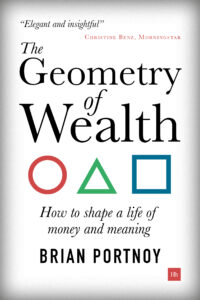Happiness & Wealth
How does money figure into a happy life? Behavioral finance expert Brian Portnoy delivers an inspired answer based on the idea that wealth, truly defined, is funded contentment. It is the ability to underwrite a meaningful life.
His latest work, The Geometry of Wealth , bridges the philosophical and practical gap in managing money in our lives.
Millions are Not Ready for Retirement
You point out that millions of Americans have not saved a dime for retirement. Why is this? Will this eventually cause a crisis or is this typical and then people catch up?
The lack of retirement preparedness stems from a combination of opportunity and mindset. In the context of real wages for many Americans having not risen in more than a generation, many are barely able to make ends meet, let alone build a nest egg. Beyond that, financial illiteracy is a major problem. As a society we don’t take seriously the need to understand the many facets of saving, spending, and investing. Further, humans are generally wired with biases that undermine smart money decisions. This mix of factors is at the root of the looming retirement crisis in America. Far too many have saved far too little, and there are no obvious solutions that don’t involve quite painful decisions.
The Importance of Purpose
Your model is in three parts: purpose to priorities to tactics. Part one is purpose, which is not a typical starting point in many financial books. Talk about the importance of purpose in this context.
Let’s step back and ask, “What are we all trying to accomplish here?” I think an answer that mostly everyone would get behind is that we want to be happy; we want to lead a good life. Okay, fine, but how do you do that? It’s obviously a massive question, with countless angles from philosophy and religion and other domains. Money, for better or worse, is an inescapable part of the discussion. There are certain unavoidable practicalities of what we can afford and how those help to underwrite the lives we want to lead. By putting purpose first, by being thoughtful – not just once, but over time – about where we find joy, then we are much better able to have our financial decisions support that quest. This is the opposite of what many unfortunately do, which is let the desire for and experience with money determine what we do in life.
How is fulfillment and happiness related to financial well-being? Talk about the intersection of money and happiness.
Money and happiness intersect in complicated ways, but we can boil it down to this: There are two primary forms of happiness and thus two ways in which money might “buy” happiness. In one sense, there is the day-to-day happiness we experience; this is our mood, our affect. It’s what we “feel” almost all of the time. By contrast, there are the occasional reflective moments where we wonder whether we are happy, whether our life is moving in a desired direction. In the first instance, beyond a middle-class income, more money does not drive more happiness. Many people believe it does, or at least act like they believe that. In the second, recent research suggests that higher incomes can produce more contentment—if spent in the right way. Buying experiences and spending on others are two important ways in which people can buy more happiness in the “big picture” sense.
Set the Right Priorities
Let’s move to priorities. Not as fun, you point out, but critically important to our future. How do we best set priorities?
 It’s critically important to build and maintain what psychologists call a “prepared mind.” Especially now in our digital world, we become quickly overwhelmed by too much noise. So let’s use a bit of thoughtfulness to make a big difference. As I see it, our money lives have three main priorities and in this order: we first think about managing risk in the broadest sense where we try to make balanced decisions about career, family, community, as well as the many particulars of financial life. According to the principle of “loss aversion,” losses are more psychologically painful than gains are pleasurable. So minimizing regret, versus maximizing gain, is a critical – and often overlooked – part of the process. Second, we need to carefully balance what we own versus what we owe. If that’s not in order, our money lives will be unstable. With those two priorities met, we are then in a great position to reach for the many wonderful things life has to offer.
It’s critically important to build and maintain what psychologists call a “prepared mind.” Especially now in our digital world, we become quickly overwhelmed by too much noise. So let’s use a bit of thoughtfulness to make a big difference. As I see it, our money lives have three main priorities and in this order: we first think about managing risk in the broadest sense where we try to make balanced decisions about career, family, community, as well as the many particulars of financial life. According to the principle of “loss aversion,” losses are more psychologically painful than gains are pleasurable. So minimizing regret, versus maximizing gain, is a critical – and often overlooked – part of the process. Second, we need to carefully balance what we own versus what we owe. If that’s not in order, our money lives will be unstable. With those two priorities met, we are then in a great position to reach for the many wonderful things life has to offer.
Under your three-part model, where do most people go wrong?
The biggest error is starting at the end, not the beginning. We tend to get wrapped up with all the minutia of our finances and lose track of the bigger picture. First, think about the life you want to underwrite. Then many of the other pieces will fall into place.
And now an age-old question: What is true wealth?
True wealth is the ability to underwrite a meaningful life, however one chooses to define that. It’s what I refer to as “funded contentment.” In order to achieve it, high-minded purpose and in-the-weeds practicalities must be thoughtfully calibrated. I strongly distinguish this view from being “rich,” which is usually an unsatisfying treadmill on which running faster doesn’t get you further ahead.

